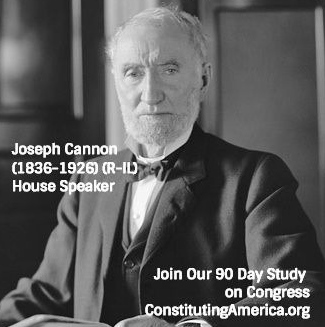Revolt Of 1910 Against House Speaker Joseph Cannon (1836-1926) (R-IL)
LISTEN ON SOUNDCLOUD:
Every fourth of July American citizens recognize the signing of the Declaration of Independence and the revolution that gave birth to our country, but very few remember the revolution that occurred in Congress about one hundred years after the revolutionary war. That revolution has had profound effects on how Congress works today.
This revolt occurred in 1910 and was a revolt against the Speaker of the House. It featured Joseph Cannon, a powerful and formidable speaker who used his power to the hilt in order to ensure that the will of his party was carried out through the representative body of the nation. The revolt against the Speaker is not only a unique story in our nation’s history, but one that modified the orders of the House and the powers of its Speaker.
Prior to this revolt Speakers of the House had three important powers that allowed them to fulfill the will of their party. They had the power of committee appointment, the power of recognition, and they were the chair of the “rules committee.” These powers in tandem allowed the Speaker to dictate the bills that would reach the floor, recognize who would speak on the given bill, and also determine the rules that governed the deliberation upon the bills. Speakers would typically use these powers on behalf of their party, to ensure that the majority party was able to pass the agenda that voters sent them to Congress to enact.
In 1910, however, the Republican Party, of which Cannon was the leader in the House, was divided between conservatives and progressives. Cannon, a conservative, was consistently suppressing the influence of the progressives in his own party. Progressive politicians, who deeply distrusted parties in general, began to resent the power vested in the Speaker which was being used to thwart them. They believed that political parties rendered government corrupt and irresponsible; that the laws that actually governed the nation were not a product of the people, but rather of a select group of interested individuals who used their personal influence to control the government.
It was a progressive Republican, George Norris of Nebraska, who worked to weaken party power at the Congressional level. After serving in Congress for many years, the opportune time finally arose. On Saint Patrick’s Day, 1910, while many of the Republican representatives were out celebrating, Norris introduced a resolution to strip Speaker Cannon of his power over the Rules Committee, which had the power to send bills to the floor of the House for debate, vote, and passage. He noticed that many of Cannon’s loyal partisans were out celebrating and thus unable to swing the vote in defense of their party leader.
There was a problem: Cannon had the power to determine whether Norris could introduce his resolution in the first place. Norris claimed that his resolution was privileged by the Constitution and therefore had priority over all other business. This would mean that even the Speaker could not prevent the House from proceeding with the resolution. Cannon had to determine whether the Norris resolution was privileged, but he knew that the entire House would vote either to uphold or to overturn his ruling. Stalling, he allowed members of the House to debate whether the resolution was privileged, and the debacle lasted the entire night. Shortly after midnight the sergeant at arms was ordered to take absent members into custody and bring them back to the House to produce a quorum.
The debate, which began in the middle of the afternoon on March 17th, ended with no decision at 2 P.M. on March 18th. The following day Cannon ruled that the resolution was not privileged, and therefore could not be heard. Norris and his allies were prepared for this and they appealed to the entire House. Cannon was overruled in a vote of 182 to 163, and Norris’ resolutions passed by a margin of 191 to 156.
From that point on, the Speaker of the House would never again have the powers that enabled him to represent the will of his party and push his party’s agenda through the House of Representatives. Committee chairs became “barons” of the House, no longer subject to the control of Speakers and the majorities they represented. This committee chair-dominated system lasted for decades, until recently, when the Speaker regained some of his influence, including the power to appoint the members of the Rules Committee. Still, even today, Speakers are much weaker than they were in Cannon’s day. Back then, they were called “czars.” Today, they have the ability to determine the agenda, but not the power to influence members of the House to vote for it.
Joseph Postell is Associate Professor of Political Science at the University of Colorado-Colorado Springs. During the 2017-18 academic year he is a visiting fellow in the B. Kenneth Simon Center for Principles and Politics at The Heritage Foundation. Postell is the author of Bureaucracy in America: The Administrative State’s Challenge to Constitutional Government. He is also the editor of Rediscovering Political Economy and Toward an American Conservatism: Constitutional Conservatism during the Progressive Era. Follow him on Twitter @JoePostell.
Samuel Postell is a Ph.D. student at the University of Dallas.




Join the discussion! Post your comments below.
Your feedback and insights are welcome.Feel free to contribute!